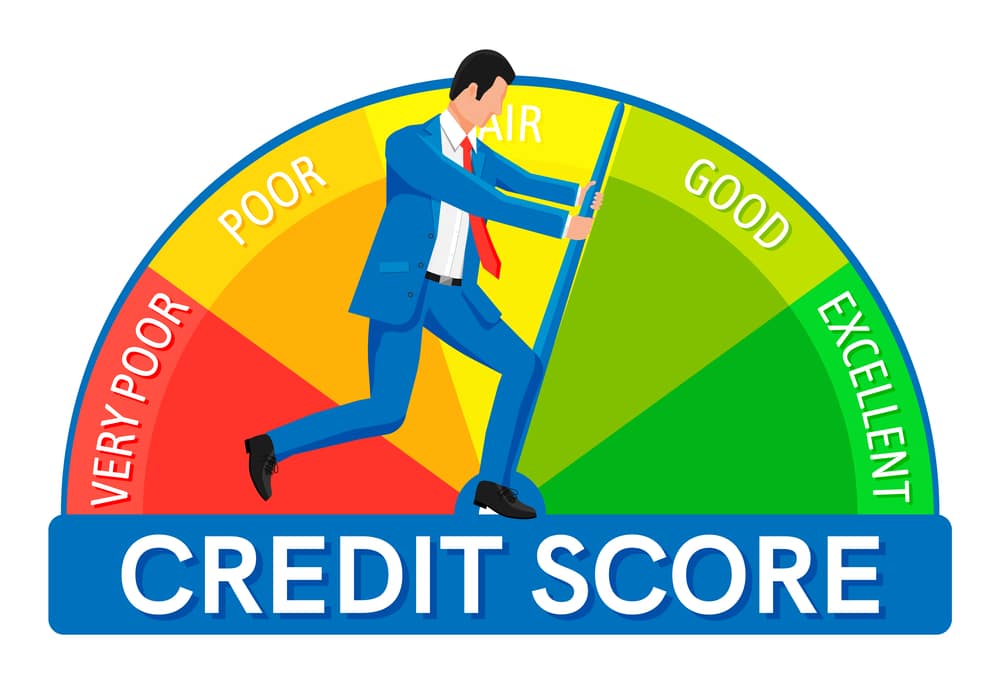Editorial Note: We earn a commission from partner links on Doughroller. Commissions do not affect our authors’ or editors’ opinions or evaluations. Learn more here.
Was one of your year-end goals to improve your credit score? Or maybe you’re hoping to buy a home soon. Perhaps you just like to be on top of all of your financial data, especially your credit score. The best credit score sites can keep you on top of your financial future.
Regardless of your reasons, checking your credit often can have a powerful impact on your long-term financial health. Studies show that checking your credit score often actually helps you improve it.
You may be wary of free options, wondering if their scores are accurate, or what lenders will see when you apply for a line of credit. But the truth is, that lenders can choose from more than twenty different FICO scoring models plus models from other credit scoring companies. And since you never know which exact score a lender will check, it’s next to impossible to know the exact score a lender will see for you.
So in many cases, the best credit score sites will get the job done. Read on for our picks for the top five reporting sites.
The Best Credit Score Sites
| Credit Score Site | Free Credit Score? | Credit Bureaus |
| Credit Karma | YES | Equifax / TransUnion |
| WalletHub | YES | TransUnion |
| myFICO | NO | Experian / Equifax / TransUnion |
| Credit Sesame | YES | TransUnion |
| Credit.com | YES | Experian |
| Experian | NO | Experian |
1. Credit Karma
Credit Karma bases your score on the VantageScore 3.0, which is becoming more popular with some lenders. But even if your lenders don’t prefer this score, it gives you a good idea of what your credit looks like based on both your TransUnion and Equifax scores.
Have you ever wondered how a particular move might affect your credit? One of the best parts of Credit Karma is its easy-to-use credit score simulator. This lets you see how different potential moves, like paying down debt, missing a payment, opening a new account, or closing an old card might affect your credit score. It’s a helpful way to plan out your credit moves when you’re hyper-focused on improving your credit or even to find some extra motivation for paying down debt.
Another advantage of Credit Karma is that it updates your scores daily. It’s nice to know that if something is off with your credit, you can know sooner rather than later. And you can even get alerts when your credit score increases or decreases.
As with most of the other free credit score sites, Credit Karma makes its money by giving you recommendations on different types of loans and financial products. If you’re on the hunt for a consolidation loan or credit card, it can help you find lenders that might be a match based on your credit profile. And if you go with those lenders through the Credit Karma site, they’ll get a commission from the lender.
2. WalletHub

A relative newcomer to the free credit score arena, WalletHub has a slick interface, detailed credit and savings monitoring, and updates your credit score daily. This can be helpful if you’re paying off debt or other moves that could impact your score rather quickly. But keep in mind that your credit information isn’t going to the bureaus daily, so you may not see changes immediately.
To sign up, you’ll need to input some personal information, like income, expenses, and other debts. WalletHub uses TransUnion and the TransUnion VantageScore to calculate your score. The dashboard contains information like your credit accounts, balances, your credit utilization, and any negative marks your credit might have.
The advertising on WalletHub is less obtrusive than with the other two sites, but it’s still there. Overall, this is another nice place to get your approximate credit score for free.
3. MyFICO
myFICO is the king of the credit score. Remember how we said you shouldn’t likely be paying lots of money every month for your credit score? Well, that’s true. But it’s also true that you sometimes might want to pay for an official score.
For instance, if you’re getting ready to apply for a home loan, you may want to know for certain what your credit score is. Again, this may not be the exact score a potential lender will see because FICO has so many models. But, 90% of top lenders use FICO scores, so it’s a good bet.
RELATED – Best Apps to Boost Your Credit Score
Get your FICO Score Version 8 and monthly monitoring and Equifax credit reports for free. Or, upgrade to the $29.95/month version and get your FICO score (all available versions), 3-bureau FICO Score 8 monitoring and reports every three months, plus FICO Score versions for mortgages, auto loans, and more. You’ll also get $1 million in identity theft insurance, 24/7 identity restoration, and identity monitoring.
Or spring for the premier version and get all the above, with monthly updates, for $39.95/month.
4. Credit Sesame
If you don’t need your FICO score, and the occasional check of your credit score and report will suffice, then Credit Sesame is a solid choice. Using information from TransUnion, you’ll get daily refreshes of your score, plus a free credit report summary and account monitoring.
Credit Sesame gives you a comprehensive look at your credit score. You’ll see the factors that affect your score, where you need to take immediate action, and what steps you need to take to improve your credit. Your “Sesame Grade” gives you a letter grade based on the five major factors that affect your credit (inquiries, credit mix, age of credit, payment, and usage). Plus, receive notifications when your credit changes, which allows you to catch potential errors.
While it doesn’t come with a ton of extras, with Credit Sesame, you’re able to access the information you need to keep tabs on and improve your credit score.
5. Credit.com

If you want to build your credit and get access to a free credit score and credit report card, Credit.com may be your answer. This free credit score site uses Experian data to calculate your score, then shows how that score affects other aspects of your financial life, like the interest rates you’ll get from lenders.
Credit.com delivers an updated Experian credit score automatically every two weeks, but you can also log into the app to see your score at any time. We also like the detailed breakdown of each credit factor and how it affects your score, plus suggestions on how to improve.
And, like many free credit reporting sites, Credit.com also offers “personal recommendations,” or ads, for credit cards and personal loans.
Experian
One of the three major credit bureaus, Experian offers it’s CreditWorks product that will give you access to your FICO score and show you the factors that are responsible for it.
When you sign up, you’ll be charged just $1 for a seven day trial that will provide you access to your score, report and full access to all Experian features. After the free trial has ended, the cost of Experian CreditWorks is $21.95 per month.
A few of the features you’ll have with CreditWorks include:
- Security Freeze – Ability to freeze access to your credit report at any time
- Fraud Alerts – Immediate notifications when your report changes and when accounts could have been added fraudulently
- Disputes – When you find something on your credit report that doesn’t belong, you can immediately file a dispute.
Don’t Forget About Your Free Credit Reports
AnnualCreditReport.com
Remember, you can always get one free credit report (not score) per year from each of the three credit reporting bureaus via AnnualCreditReport.com.
This free credit reporting site gives you one free credit report from each credit bureau once a year, a right ensured via federal law. While not a free score site per say, these reports can help you find any potential errors that need to be corrected before you apply for a major loan.
Frequently Asked Questions (FAQ)
How often should I check my credit score?
Experts suggest checking yours at least once a year, but you’ll probably want to keep closer tabs on both your credit score and report if you’re trying to improve your credit or plan to make a big purchase, such as buying a home, in the near future.
What’s more important, my credit score or my credit report?
Your credit score is a single numerical grade (though it can vary depending on the agency or bureau it came from), while a credit report is a more detailed collection of your past credit history and performance. While more emphasis is usually put on your credit score, most lenders look at both your score and report when determining your creditworthiness.
What’s the difference between a FICO score and a VantageScore?
Both FICO and VantageScore are models used to determine your credit score, and most lenders use one of the two. (Though these models are different entities than the three credit bureaus of TransUnion, Equifax, and Experian).
While similar, there are some important differences to note. FICO and VantageScore both have the same range of 300 to 850, but the same score with each model may have a different ranking. For example, a very good credit score with FICO falls into the 740-799 range, while that same ranking using the VantageScore model is 661-780. Additionally, qualifying for a VantageScore is a bit easier than getting a FICO score.
You’ve Got Your Credit Score … Now Improve It
If you need to get a higher credit score, we recommend Experian Boost. It’s free and can see when you pay your utility and mobile phone bills. Every payment that you make that’s on time can boost your FICO Score.






